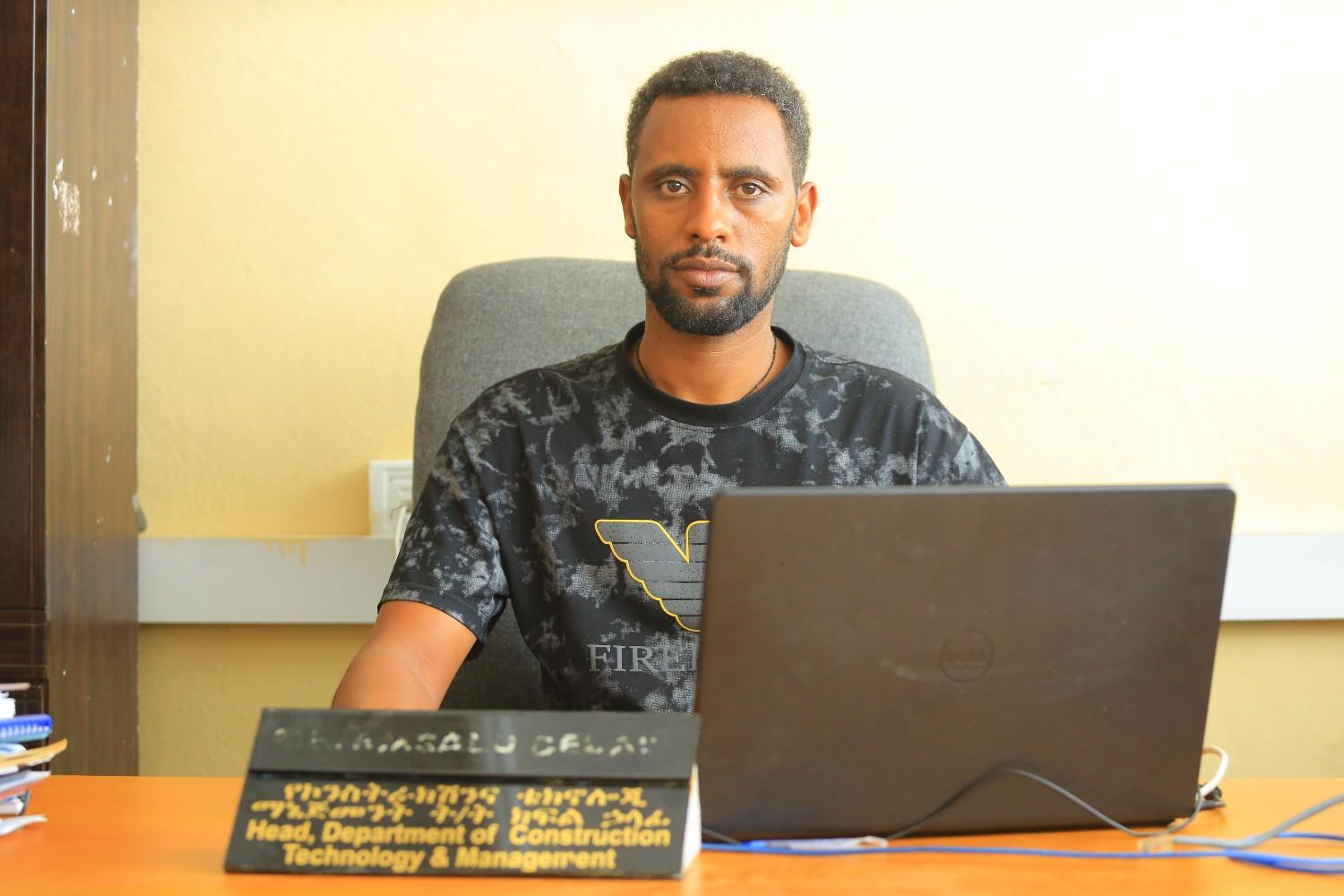
Head of Department of Construction Technology and Management (CTM)
Mr. Zeina Sisay Marew
Contact Information:
Phone: +251928576591
Email:
I. Objectives/Goals
The objective of this B.Sc. program is to produce outstanding construction technology and management graduates who have been prepared to become technological, managerial and public service leaders capable of understanding the social and environmental challenges that face the country, and who will be in a position to make a meaningful contribution to both national social and economic growth and development as well as being able to respond to, and benefit from, the impact of global change. The institute and the staff are committed to creating a learning environment that provides a level of knowledge and competency in these areas, through an innovative program of study, supported by a capability in information technology use, coupled with a capacity to integrate the key social and environmental issues facing the country.
The program is aimed primarily at training professionals required for managing constructing projects with efficient and effective management system, administer contracts, conduct researches to identify real problems on site pertaining to construction management, methods & materials, and find better solutions It will produce well qualified managing engineers knowledgeable in construction engineering areas of structural, geotechnical and highway engineering, at the same time those graduates will also have extensive knowledge of construction technology and project management skills, and can be actively engaged in the planning, development and management of construction/infrastructure projects.
The Head of the Department of Construction Technology and Management (CTM) is responsible for achieving the following specific objectives:
- Deliver Quality Education in Construction Technology and Management: To ensure students gain strong theoretical knowledge and practical skills in construction planning, project management, building technologies, and sustainability.
- Produce Competent Graduates for the Construction Industry: To prepare students to meet the dynamic demands of the construction sector with proficiency in project management, cost control, quality assurance, and safety.
- Promote Research and Innovation in Construction: To encourage staff and students to conduct applied research in areas such as construction materials, green building practices, infrastructure development, and digital construction technologies (e.g., BIM).
- Strengthen Industry and Community Linkages: To foster partnerships with contractors, consulting firms, public infrastructure agencies, and community stakeholders for mutual learning and service delivery.
- Support Staff Development and Institutional Capacity: To build a qualified and motivated team of academic and technical staff through continuous professional development.
- Ensure Quality Assurance and Academic Standards: To maintain high academic standards through curriculum relevance, assessment integrity, and regulatory compliance.
- Contribute to the Strategic Vision of Wolkite University: To align departmental goals with the university's mission in science, technology, and community transformation.
II. Duties and Responsibilities
A. Academic and Curriculum Leadership
- Lead the development, implementation, and review of undergraduate (and potential postgraduate) programs in Construction Technology and Management.
- Ensure that the curriculum includes core areas such as project planning, cost estimation, construction law, building information modeling (BIM), safety management, and sustainable construction.
- Promote modern teaching methods, including case-based learning and project-based assessments.
B. Administrative and Operational Management
v Develop and execute the department’s strategic and annual plans, budgets, and academic calendar.
v Coordinate the allocation of teaching loads, classroom and laboratory scheduling, and exam administration.
v Ensure proper documentation of departmental activities and academic processes.
C. Faculty Supervision and Development
v Assign duties to academic and technical staff based on expertise and workload balance.
v Support faculty in pursuing higher education, attending training programs, and engaging in research and consultancy work.
v Conduct staff performance appraisals and recommend promotions or professional development actions.
D. Research and Project Coordination
v Encourage research and innovation in construction practices, infrastructure development, and technology adoption.
v Facilitate publication of research findings and promote staff participation in national and international conferences.
v Support collaborative research with industry partners, other universities, and research institutes.
E. Student Support and Academic Advising
v Monitor student academic performance, discipline, and welfare.
v Ensure effective supervision of student projects, internships, and fieldwork.
v Promote extracurricular learning opportunities such as student clubs, technical competitions, and workshops.
F. Industry and Community Engagement
v Establish partnerships with construction companies, project management firms, government agencies, and NGOs for student internships, industry visits, and joint research.
v Promote community-based construction initiatives, such as school buildings, water systems, and housing projects.
v Invite industry professionals as guest lecturers and external examiners.
G. Quality Assurance and Compliance
v Ensure the department adheres to HERQA standards and internal university quality assurance mechanisms.
v Collect feedback from students, alumni, and industry to guide curriculum updates and instructional improvements.
v Prepare the department for accreditation, audits, and reviews.
H. Institutional Representation and Strategic Contribution
v Represent the department in university-level committees, faculty boards, and strategic planning bodies.
v Contribute to the development of policies and initiatives that advance the university’s academic mission.
v Foster a culture of accountability, teamwork, and continuous improvement.
